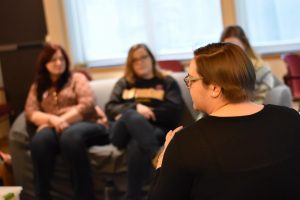Women’s Center hosts discussion about masculinity in the White House
February 22, 2018
The UW Oshkosh Women’s Center hosted its first Masculinity Monday discussion of the semester. The discussion, which took place on Feb. 19, took on the topic of how masculinity is negotiated and addressed in the highest government seat in the country.
Alicia Johnson, director of the Women’s Center, said Masculinity Mondays are held biweekly in the Women’s Center and are meant to invoke discussion on masculinity in different areas of day-to-day life.
“We want everyone on this campus to be successful and to have a really positive experience,” Johnson said. “What the research shows is that toxic notions of masculinity can impede or interfere with that success with everything from mental health to academic success.”
The discussions range vastly in their topics and are intertwined into discussions on other topics related to gender equity Johnson said.
“We can’t reach gender equity unless we’re having these conversations and understandings,” Johnson said. “Everyone needs to be a part of the discussion; we can’t move forward unless we’re all moving forward.”

Political science professor Jerry Thomas was in attendance and said he believes Teddy Roosevelt was the quintessentially masculine president.
“These images of Teddy Roosevelt are very powerful and show domination at the top as if he were the king of the jungle,” Thomas said.
Thomas said Franklin D. Roosevelt’s form of masculinity was different from that of Teddy Roosevelt’s due in part to his physical incapabilities.
“FDR never wished to be photographed in his chair, but in most of his photos he was seated,” Thomas said. “Whenever he was standing he always had to have someone to hold onto, which was not a masculine image at all, but for FDR we accepted it at the time.”
Another aspect of FDRs different form of masculinity was his fireside chats and how those chats presented a different image of the presidency to the American people, Thomas said.
“He wasn’t a sort of standing or ovating radio deliverer,” Thomas said. “The image of him that he constructed as part of the presidency was, ‘I am going to sit by the fire and just chat with the American people,’” Thomas said.
Community advisers Jacob Scheff and Maya Gengler from Fletcher Hall said they attended the discussion to try and implement a similar program into the residence halls.
“Staff members get to choose a training of their choice and then deliver it to the rest of staff, and one of our sessions was on masculine health and masculinity,” Scheff said. “I really responded to the topic, and a lot of the things that were brought up were brainstorming ideas for us to implement into reslife.”
Gengler said the implementation of this idea of masculinity discussions into the residence halls may be difficult for some to see as an important aspect of healthy living, but is integral in all parts of one’s life.
“It filters into all aspects of who you are as a person: mental health, physical health, social health,” Gengler said. “Literally everything that you are, this will have an effect on it.”

Gengler said she and Scheff hope to work in tandem with the Women’s Center to gain information on the topic and to implement it into residence life quickly and effectively.
“We definitely aren’t experts on the topic, and so we definitely wanted to team up with people who are experts,” Gengler said.
The Women’s Center on campus is a good place for students to learn more about gender equity and to be a part of discussions that are important to them, Johnson said.
“The Women’s Center is a constant center for gender equity and the work towards it on campus,” Johnson said. “People assume that we only work on behalf of women, but we work on behalf of gender equity and we can’t have gender equity if not everyone is a part of that conversation.”
The next masculinity Monday will be on Monday, March 5 at the Women’s Center discussing the topic of video games.













